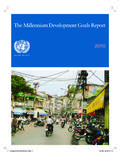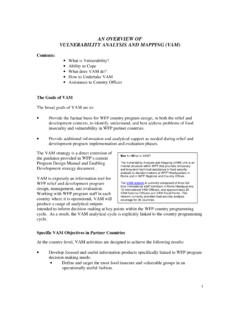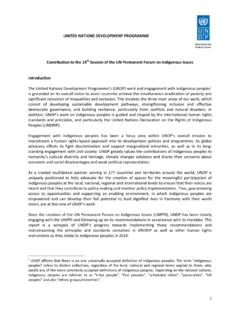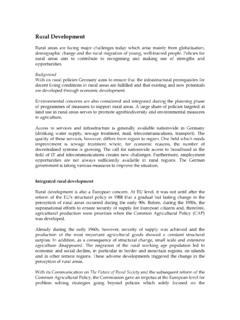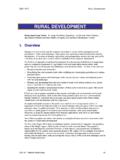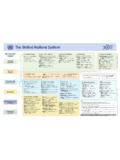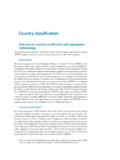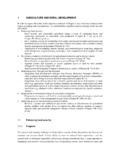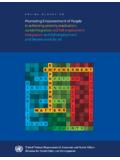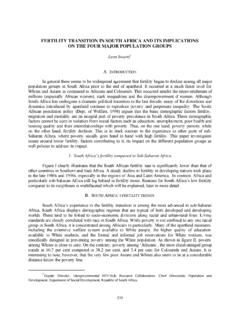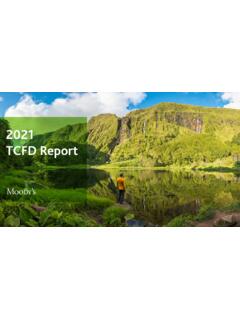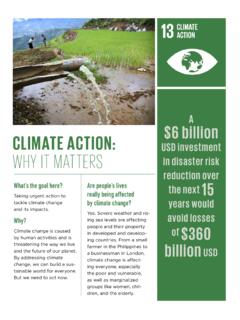Transcription of THEME REPORT ON ENERGY TRANSITION - United Nations
1 THEME REPORT ON ENERGY TRANSITION TOWARDS THE ACHIEVEMENT OF SDG 7 AND NET-ZERO EMISSIONSP ublished by the United Nations Copyright United Nations , 2021 All rights reservedFor further information, please contact: Secretariat of the High-level Dialogue on ENERGY 2021 Division for Sustainable Development Goals Department of Economic and Social Affairs United Nations Email: ACKNOWLEDGEMENTSThis REPORT was prepared in support of the High-level Dialogue on ENERGY that will be convened by the UN Secretary-General under the auspices of the UN General Assembly in September 2021, in response to resolution 74/225. The preparation for the Dialogue has been coordinated under the leadership of the Dialogue Secretary-General, LIU Zhenmin, Under-Secretary-General for Economic and Social Affairs, and the Co-Chairs of the Dialogue and UN- ENERGY , Achim Steiner, Administrator of UNDP and Damilola Ogunbiyi, Special Representative of the UN Secretary-General for Sustainable ENERGY for All.
2 The views expressed in this publication are those of the experts who contributed to it and do not necessarily reflect those of the United Nations or the organizations mentioned in this document. The REPORT is a product of a multi-stakeholder Technical Working Group (TWG) which was formed in preparation of the High-level Dialogue. UN- ENERGY provided substantive support to the TWG throughout the development of this outstanding commitment and dedication of the Co-lead organizations under the leadership of Francesco La Camera, Director-General of IRENA; Inger Andersen, Executive Director of UNEP; and Armida Salsiah Alisjahbana, Executive Secretary of UN ESCAP, in guiding the process that led to this REPORT was truly remarkable. Special thanks are due to the experts from the Co-Lead organizations who spearheaded the development of this REPORT , namely, Elizabeth Press, Anastasia Kefalidou, Claire Kiss (IRENA); Mark Radka, John Christensen, Miriam Hinostroza, Giulia Ferrini (UNEP); Hongpeng Liu and Sergey Tulinov (UN ESCAP).
3 Without their knowledge, drafting skills and adept steering of the deliberations, this REPORT would have been impossible. THE TWG ON ENERGY TRANSITION CONSISTED OF: Co-Lead organizations International Renewable ENERGY Agency (IRENA) United Nations Environment Program (UNEP) United Nations Economic and Social Commission for Asia and the Pacific (UN ESCAP)TWG MembersFaye Alhersh MASDARAda mon City of BudapestBj rn Andresen Aarhus UniversityDaniele Agostini EnelJaviera Aldunate Ministry of ENERGY of ChileSafiatou Alzouma Africa Renewable ENERGY InitiativeTOWARDS THE ACHIEVEMENT OF SDG 7 AND NET-ZERO EMISSIONSIJaff Epse Bime Ministry of Water Resources and ENERGY of Cameroon Marilyn BongmoNoam Boussidan World Economic ForumXiangkun (Elvis) Cao Cornell UniversityS ren Dengg Federal Ministry for Economic Cooperation and Development of GermanyGabriela Prata Dias Copenhagen Centre on ENERGY EfficiencyTasneem Essop climate Action NetworkJudith Franco Argentinian Association of Renewable ENERGY and the EnvironmentMonica Gullberg Green climate FundLucy Heintz ActisDitte Juul J rgensen Directorate General for ENERGY , European CommissionVladislav Kaim UN Secretary General s Youth Advisory Group on climate ChangeNg y Th Khanh Green Innovation and Development Centre (GreenID)
4 In VietnamAm lie Lougsami Ministry of Europe and Foreign Affairs of FranceMadalena Call Lucas EDP - Energias De Portugal SAGrammenos Mastrojeni Union for the MediterraneanWanjira Mathai WRI AfricaLaura Mart n Murillo Just TRANSITION Institute, Ministry for Ecological TRANSITION and Demographic Challenge of SpainTosi Mpanu-Mpanu Ministry of Environment of the Democratic Republic of CongoHaiyan Qin Chinese Wind ENERGY AssociationRicardo Raineri Bernain Pontificia Universidad Cat lica de ChilePablo Salas Economics of ENERGY Innovation and Systems TRANSITION ProjectYouba Sokona International Panel on climate ChangeRobert Stoner Massachusetts Institute of TechnologyFrank Qiankun Wang GEIDCOS heila Watson FiA FoundationAli Zerouali Moroccan Agency for Sustainable Technical representatives of UN- ENERGY member organizations provided substantive inputs and support throughout the development of this REPORT . The member organizations of UN- ENERGY are: FAO, IAEA, IFAD, UNCDF, UNCTAD, UN DESA, UNDP, UN ECA, UN ECE, UN ECLAC, UN ESCAP, UN ESCWA, UNESCO, UNEP, UNFCCC, UNFPA, UN-Habitat, UNICEF, UNIDO, UNITAR, UN-OHRLLS, UN Women, World Bank, WHO, WMO, and partner organizations IRENA and SEforAll.
5 THEME REPORT ON ENERGY TRANSITIONIIThe REPORT was prepared based on a series of interactive meetings of the TWG, which were chaired by the Co-leads, to discuss draft versions in the period of February to May 2021. This was complemented by multiple rounds of written feedback on the input was received from representatives of some of the Member State Global Champions for ENERGY TRANSITION : the Global Champions for ENERGY TRANSITION are Brazil, Chile, Colombia, Denmark, Germany, India, Nigeria, Poland, Spain, and the United Kingdom. The views expressed in this publication do not necessarily reflect those of the Member State Global Dialogue Co-Chairs teams from the United Nations Development Programme and the Special Representative of the Secretary-General for Sustainable ENERGY for All provided coordination support and dedicated technical expertise throughout the entire processes of the TWG.
6 Their tireless efforts, commitment to results and outstanding partnership were key to the success of the TWG. Special thanks are due to Pradeep Kurukulasuriya, Marcel Alers, Sophie Guibert, Christelle Odongo, Scott Williams, Mateo Salomon, Milou Beerepoot, Riad Meddeb, Anne Marx Lorenzen, Sabina Blanco Vecchi (UNDP); Yangyang (Nora) Li, Maame Boateng, Kanika Chawla, George Hampton, Ben Hartley, Ruba Ishak, Amir Bahr, Olivia Coldrey, Christine Eibs-Singer and Hannah Girardeau (SEforAll) for their dedication to making this process a success. As the Secretariat of the High-level Dialogue on ENERGY , the Division for Sustainable Development Goals (DSDG) at UN DESA designed, coordinated and facilitated the meetings, discussions and interactions of the Technical Working Group, in close collaboration with the Co-lead organizations. Martin Niemetz from the Secretariat provided coordination support to the Technical Working Group, under the leadership of Minoru Takada and the overall guidance of Alexander Trepelkov, Officer-In-Charge of DSDG and Shantanu Mukherjee, Chief, Integrated Policy Analysis Branch of DSDG at DESA.
7 The Secretariat staff consisted of: Bahareh Seyedi, Nadine Salame, David Koranyi, Isabel Raya, Avrielle Darcy Miller, Dylan Grant, Pragati Pascale, Daniella Sussman, Merve Kosesoy, Xiaoyi Wang, Guangtao Zhang, Anna Bessin, Jeffrey Strew and Bo Fu. The Capacity Development Office at UNDESA provided overall operational support during the process. Special thanks are extended to Kathryn Platzer who provided invaluable copyediting to ensure accuracy, consistency and readability, and also to Camilo Salomon for the excellent work on the graphic design and production of the support was provided by Norway, the Netherlands, China through the United Nations sub-trust fund for the 2030 Agenda for Sustainable Development, as well as ENERGIA and further information, please contact: Secretariat of the High-level Dialogue on ENERGY 2021 Division for Sustainable Development Goals Department of Economic and Social Affairs United Nations Email: THE ACHIEVEMENT OF SDG 7 AND NET-ZERO EMISSIONSIIIE nergy can create transformational opportunities.
8 For the 759 million people in the world who lack access to electricity, the introduction of clean ENERGY solutions can bring vital services such as improved healthcare, better education and affordable broadband, creating new jobs, livelihoods and sustainable economic value to reduce poverty. In regions such as sub-Saharan Africa where half of secondary schools and a quarter of health facilities have no power, clean ENERGY access will help save lives, and offer opportunities for prosperity at a transformative ENERGY revolution based on renewables and ENERGY efficiency is urgently needed not just to accelerate economic progress and development, but also to slash emissions that are rapidly warming our planet. The ENERGY sector today, dominated by fossil fuels, accounts for 73 per cent of human-caused greenhouse gas emissions. Global CO2e emissions must be halved by 2030 to avoid an increasing frequency and severity of dangerous and unprecedented weather extremes, including heatwaves, devastating floods and droughts, risks to food and water security, population displacement, and loss of lives and livelihoods.
9 As governments start to define a pathway out of the COVID-19 crisis, we must now ensure that all countries have the chance to be part of an ENERGY TRANSITION that seizes the opportunity to significantly improve the wellbeing of people, and will not be an easy task. To ensure a just TRANSITION , we must support countries and communities to adapt to a green economy through social protection and new skills, ensuring all who need to be are equipped to take advantage of the 30 million new green jobs expected by 2030. To generate the vital momentum needed for this TRANSITION , the UN Secretary-General is convening the High-Level Dialogue on ENERGY in September 2021, the first such meeting in 40 years. The landmark event will offer a global stage for countries to attract new investments and forge new impact focused partnerships to drive forward this ENERGY revolution. As a foundation for informed deliberations, five Technical Working Groups were established on the five key themes of the High-level Dialogue: (1) ENERGY Access, (2) ENERGY Transitions, (3) Enabling SDGs through Inclusive, Just ENERGY Transitions, (4) Innovation, Technology and Data, and (5) Finance and Investment.
10 These Technical Working Groups brought together leading experts on these subjects from across the world to identify key recommendations for a global roadmap towards the achievement of SDG7 and the climate objectives of the Paris REPORT ON ENERGY TRANSITIONIVThis proposed roadmap illuminates a way forward for how the world can achieve a sustainable ENERGY future that leaves no one behind. We hope that it will help to inspire the actions needed to get there. Mr. Liu Zhenmin Mr. Achim Steiner Ms. Damilola OgunbiyiUnder-Secretary-General for UNDP Administrator and Co-chair Special Representative of the Economic and Social Affairs and of the Dialogue and UN- ENERGY UN Secretary-General for Sustainable Dialogue Secretary-General Sustainable ENERGY for All and Co-Chair of Dialogue and UN-EnergyTOWARDS THE ACHIEVEMENT OF SDG 7 AND NET-ZERO EMISSIONSVAs co-leads of the Technical Working Group on the ENERGY TRANSITION THEME , the International Renewable ENERGY Agency (IRENA), United Nations Environment Programme (UNEP) and United Nations Economic and Social Commission for Asia and the Pacific (UN ESCAP) jointly prepared the THEME REPORT to provide an insight into the global ENERGY landscape and highlight opportunities and challenges in navigating the ENERGY TRANSITION .
